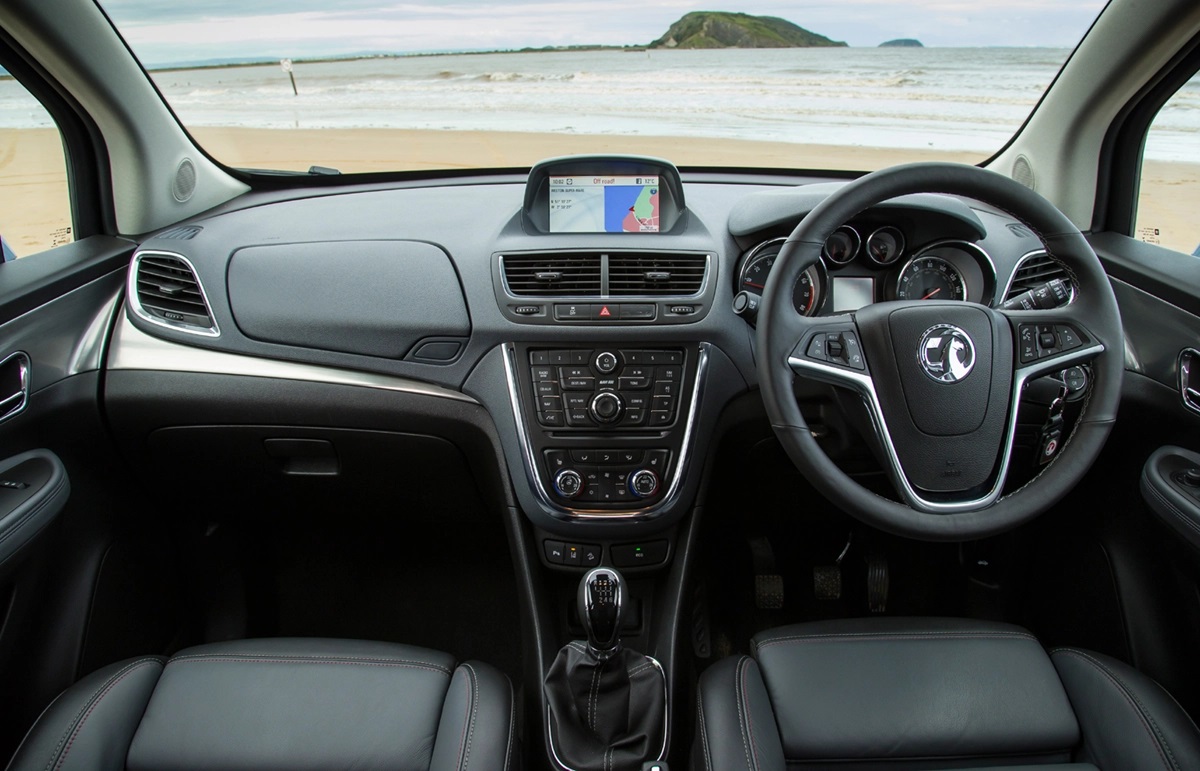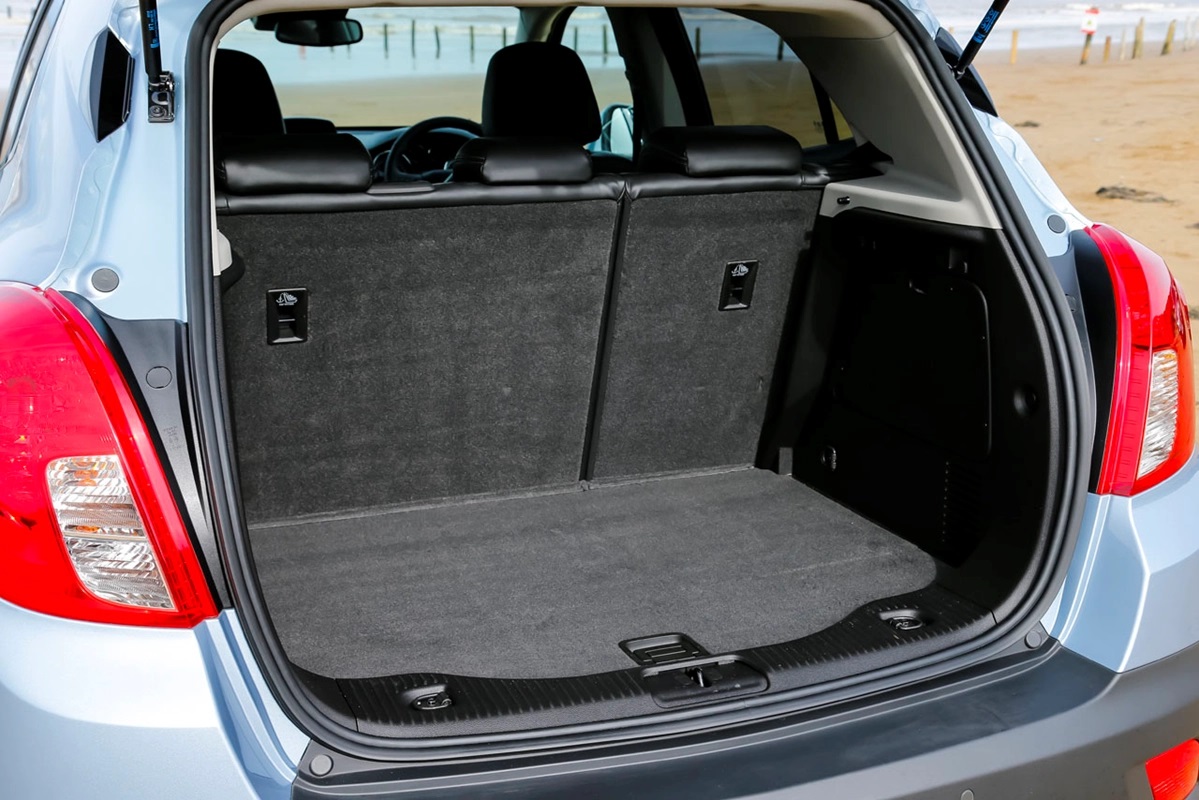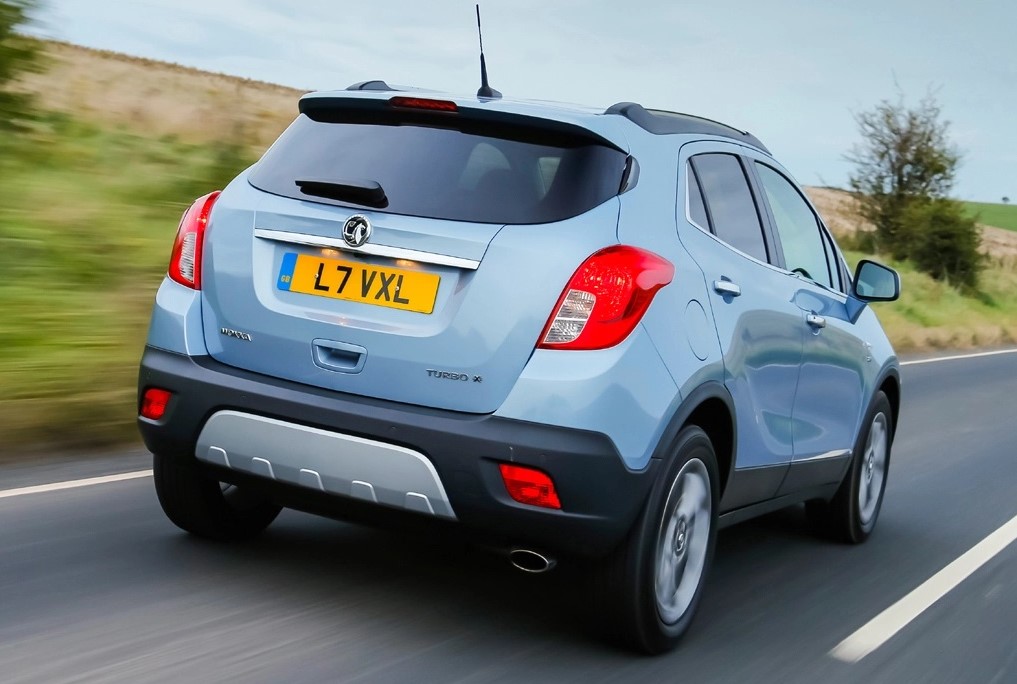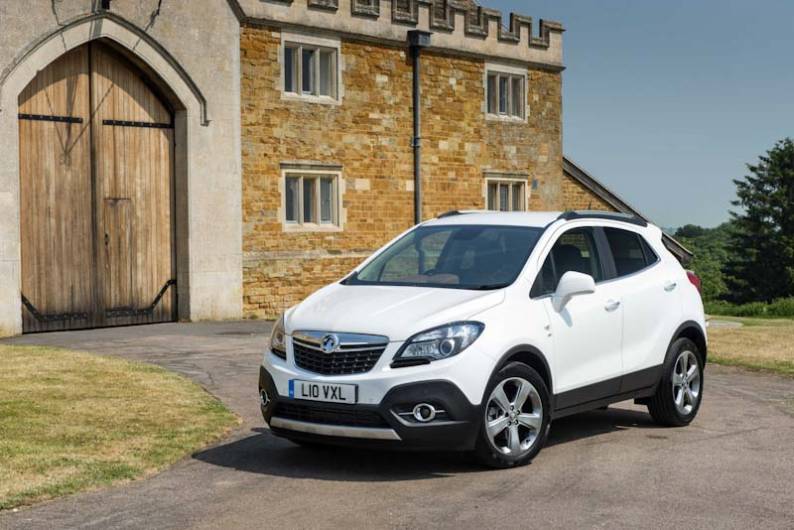
RAC sale – up to 33% off*
• Roadside cover from £5.29 a month†
• We get to most breakdowns in 60 mins or less
• Our patrols fix 4/5 breakdowns on the spot

For many years one of the best-selling cars in the UK, the Vauxhall Mokka is a top value used buy. But does that mean you should take the plunge? Our in-depth used review reveals all.
Things you'll like
- Decently spacious for its size
- Affordable and plenty of choice
- Good level of standard kit
Things to consider
- Ride and handling could be better
- Early diesel engine is gruff
- 1.6 petrol is thirsty and noisy
History: What is the 2012-2016 Vauxhall Mokka?
Vauxhall’s history with SUVs before the early 2010s was limited. Cars like the Frontera and Monterey were resolute old-school 4x4s, while the Antara was a rebadged Chevrolet. None made any meaningful impression in the market.
But in the early 2010s a new type of SUV emerged. One that took the rugged design principles of ‘proper’ 4x4s and applied them to much smaller, lighter and cheaper models with minimal off-road ability. The Nissan Juke was the first big hit, but Vauxhall’s long-awaited SUV hit – the Mokka – wasn’t far behind.
Named loosely after a type of Arabica coffee bean, the Mokka’s name was more left field than its exterior design. Although smart and chunky for a small car, it’s certainly less striking than the Nissan Juke or MINI Countryman – but it seems British drivers didn’t mind.
And nor were they bothered by the Mokka’s humble underpinnings, shared with several budget Chevrolet small cars. What it lacked in apparent sophistication it made up for in showroom appeal: the Mokka has racked up well over half a million sales in the UK alone.
But is the Vauxhall Mokka worthy as a used purchase? Our in-depth review looks at the car’s pricing, specs, interior, practicality, engines and reliability so you can make an informed choice on this popular small SUV. You can also check out our review of the updated Vauxhall Mokka X.
Verdict: is the Vauxhall Mokka a good car?
The original Vauxhall Mokka is certainly no enthusiast car, but that won’t bother potential owners. They’ll like the low secondhand prices, the plentiful standard kit, the decent practicality and the lord-of-the-manor driving position. The dated yet solid interior and punchy yet efficient turbo engines appeal, too, while on the reliability front there doesn’t appear to be any major issues. If you’re after a sensible, affordable and relatively spacious small SUV, you can do a lot worse than the Mokka.
Specs and used pricing
While some Vauxhalls of the era came with a bewildering array of trim levels to choose from, the Mokka kept it simple at launch with three: S, Exclusiv and top-spec SE. Tech Line was later added as a company car favourite.
.jpg)
None were particularly sparse, we even the base S featuring air-con, cruise control, a DAB digital radio and USB connectivity. All models also got a 230-volt three-pin power socket to charge things like laptops on the go – a handy touch, and rare in this period.
Exclusiv models are certainly more desirable with wheelarch-filling 18-inch alloys, all-round parking sensors, dual-zone climate control, Bluetooth, auto lights and wipers and electric rear windows.
The main addition for Tech Line models was sat nav. But the most sought after on the used market are SE versions with part leather trim, heated front seats, a heated steering wheel (again, novel at the time) xenon headlights and tinted windows.
In terms of pricing, the Mokka wasn’t the cheapest car in its class when it launched, but its popularity and non-premium badge means there are plenty of bargains to be found on the used market.
Prices start from under £2,000 for early examples with high mileage or plenty of wear and tear. You’re better off spending around £3,000 or more for better kept models with under 100,000 miles.
Most examples sold were diesels, but if you’d rather avoid that then the strong 1.4 T petrol engine was added in 2013 - £3,500 will get you one of those. The same budget or slightly above will also get you in the quieter and cleaner 1.6-litre diesel that replaced the old 1.7 CDTI in 2015.
£4,000 brings high spec, very good condition 2015-on examples, while the cream of the crop that have been fastidiously maintained are closer to £5,000 – we wouldn’t pay anything more than that without moving into the facelifted Mokka X.
A desirable, but quite rare option is the FlexFix integrated bike carrier. Vauxhall fitted this to a few of its models – a centre section of the rear bumper pops out to reveal an Ikea-style fold-out bike holder. Ensure it isn’t damaged before using it, however.
Rivals
The Vauxhall Mokka is slightly larger than a Nissan Juke, but you’d consider one a rival if space isn’t your number one priority. Closer in size are models like the Peugeot 2008, Renault Captur and Ford EcoSport, while the added desirability of the Kia Soul and MINI Countryman may be more up your street.
The Mokka’s size means it straddles the small and mid-size SUV sector, however, so you might want to consider models like the Nissan Qashqai or Skoda Yeti as alternatives too.
Interior and practicality
With its somewhat dated, button-heavy dash layout the Mokka’s cabin design is similar to that of the Astra of the 2010s, albeit with some unique storage details and a more wraparound design.
It’s not the most visually inspiring small SUV interior but there’s no arguing with the decent feeling of solidity – all the switchgear felt built to last when it was new, although the condition of it now depends on how a particular example has been looked after.

Having buttons for key functions also means you aren’t messing about with a decade-old touchscreen to find things, though. The central screen, where fitted, is basic and functional, but many models do without and have a simple non-colour radio display.
The driving position is comfortable and there’s plenty of adjustment in the wheel and seat and an integrated armrest. The commanding, full-size SUV-like driving position will appeal to many, with excellent forward visibility, although the Mokka’s rear view is compromised by thick rear pillars and somewhat narrow windows.
Passenger space, storage and boot space
You might assume the Vauxhall Mokka is the same size as the Nissan Juke, but at 4.28m long, 1.77m wide and 1.65m tall it’s a fair bit longer and taller, and closer in size to the Peugeot 2008. The Mokka stands out most for its height, being a full 10cm taller than the Peugeot.
That means that headroom in particular is generous throughout the cabin – even rear seat-passengers over six-foot will be absolutely fine. Legroom isn’t as good, but it’s still roomier than a Juke in the front and rear. Only the limited cabin width means that seating three adults across the back is a bit more of a struggle.
Storage in the Mokka’s cabin is pretty good, with the highlight being not one but two gloveboxes – one pops up from the dash top doubling space for odds and ends. You’ll also find two cubbies in the centre console, a small lidded compartment below the steering wheel and door bins that are an acceptable size.
In the rear you’ll find small door bins and pockets on the front seatbacks, plus cupholders in the centre armrest – not all rivals even have a centre armrest. But that 230-volt socket is the stand-out feature, giving rear seat occupants the ability to power entertainment or comfort devices.
The 356-litre boot is a decent size – far larger than that of a Juke but falling short of the 2008 and Captur for outright capacity. It’s a well thought out space, too, with a low load lip and tabs to make folding the seats down a doddle. 2

What is a used Vauxhall Mokka like to drive?
Don’t expect fireworks from the Mokka’s driving experience and you might be pleasantly surprised by its competence. Granted, it isn’t as agile as a Nissan Juke nor as comfortable as a Skoda Yeti, but it strikes a decent enough balance between the two.
That means there isn’t too much body roll in the bends and the Mokka grips well enough, although the steering feels artificial. The ride is on the firm side, sometimes feeling unsettled over bumps – a MINI Countryman is also firm but manages to smooth over poor surfaces more effectively.
Still, the Vauxhall is easy to drive around town, with light controls and good forward visibility making threading through traffic easy enough. The seats aren’t the most supportive, though, and both road and wind noise are noticeable (but not intrusive) at speed.
Engines
The Mokka launched with a 115hp 1.6-litre naturally aspirated petrol engine and a 130hp 1.7-litre turbodiesel. There was also a punchier 140hp 1.4-litre turbo petrol unit exclusively mated to a four-wheel drive system initially.
While the 1.6 petrol is a simple unit and the most affordable choice on the used market, it’s a dated-feeling engine now, with little get up and go at low revs (0-62mph took nearly twelve seconds) and a coarse engine note when revved out. It’s not all that fuel efficient, either, and is the only engine with just five manual gears.
Thankfully, Vauxhall saw sense and extended the 1.4 turbo petrol offering in 2013, bringing front-wheel drive and a six-speed automatic gearbox option. It’s a far stronger, torquier unit – nearly three seconds quicker from 0-62mph than the 1.6 – while also being smoother, quieter and more efficient with it.
Diesel was much more popular back when the Mokka was new, however. Initially the ageing 1.7 CDTi was your only choice. While its 300Nm of torque meant it felt gutsy, it was gruff at idle and made a right old racket when revved. It also sent more vibration through the controls than the best diesels of the time.
A much better option came in 2015 with the launch of the 136bhp 1.6 CDTi diesel. With slightly more power and torque combined with better gearing it was faster (the 0-62mph time matched the 1.4T petrol) but more noticeable was the much greater refinement – Vauxhall nicknamed it the ‘Whisper diesel’ because of this.
We’d definitely stretch to a 1.4T or 1.6 CDTI if your budget allows. This diesel also met Euro 6 emissions regulations, unlike the 1.7, meaning you currently won’t be charged to enter London’s ULEZ and other Clean Air Zones around the UK.

Ownership, running costs and reliability
The Mokka is unlikely to break the bank in terms of running costs, but we’d steer potential buyers towards the newer 1.4T petrol and 1.6 CDTi diesel engines. Not just because they’re much better all-round, they’re also quite fuel efficient.
The 1.4 Turbo petrol in manual form, for example, promises 45.6mpg on combined cycle tests, a useful jump over the 41.5mpg the much slower, non-turbo 1.6 offers. The latter also sits in a higher tax band, meaning a £255 a year car tax (VED) charge.
You can opt for an automatic gearbox on the 1.4T, which turns it into the least efficient Mokka engine – dropping the combined figure down to 40.9mpg. a 4x4 option is also available with the manual 1.4T but that has a smaller economy penalty than the auto.
It’s not hard to see why diesels were the flavour of the time, however. The 1.6 CDTI trounces the petrols with a combined 68.9mpg figure in its most efficient ‘ecoFLEX’ form, with that dropping to 65.7mpg in standard trim. It’s also an improvement over the slower 1.7 CDTI, although that still manages up to 62.8mpg. Again, toping for an automatic harms fuel economy more than option for four-wheel drive.
In terms of other potential costs, all Mokkas had a few key recalls in their life including one for potential steering wheel detachment in March 2013, seatbelt pre-tensioner glitches in 2015, water leaks into the ECU in 2016 and a potential airbag fault in 2017. Consult the government’s online car recall checker tool to ensure all have been sorted.
Reliability issues with the Mokka don’t seem to be extensive, but there are some foibles to look out for. Models fitted with adaptive headlights can encounter issues, and replacement units are expensive. Handbrakes can fail, too, while a known software fault can cause hesitation when pulling away in the 1.4T petrol.
The oil-burners can throw up diesel particulate filter issues if not used for regular long journeys – best to stick with a petrol if you’re only driving short distances.
Other reported issues are more minor – intermittent central locking or electric window switch issues, faulty sat-nav screens, flaking trim and corroding alloy wheels. Being a family car, you’ll want to check the overall condition because examples mainly used to cart kids about can pick up scuffs, bad smells, worn seats and dents.
A full service history is desirable as always, while check the condition of the brake pads and discs for wear. It's also worth seeing if the battery is up to the job of starting the car multiple times without dying to avoid an unnecessary bill.
Euro NCAP: is a used Vauxhall Mokka a safe car?
The Mokka was praised by Euro NCAP back in 2012 for its crash safety, achieving the maximum five star rating when tested including impressive adult occupant protection and an outstanding 100% rating for safety assists.
That puts it up there with the Renault Captur, while the Nissan Juke and Peugeot 2008 weren’t far behind – the four-star rating of the Ford EcoSport means it lags behind. Crucially, none of those ratings can be compared to the much tougher safety standards of 2019 and beyond, but for those on a budget it’s still peace of mind for your loved ones.
You won’t find features such as lane keep assistance and autonomous emergency braking on any Mokka, as it predates widespread fitment of such tech. But you will find six airbags, ISOFIX points for child seats in the rear, electronic stability control, a seatbelt reminder and a speed limiter on all models.
Vauxhall Mokka FAQs
Is the Vauxhall Mokka a good car?
We reckon a used Vauxhall Mokka is a solid choice if you’re on a budget. There’s plenty out there so finding a good deal isn’t hard, while the Mokka offers a decent level of space, plenty of standard kit and respectable reliability. It’s not the smoothest riding or most fun-to-drive small SUV, however.
Are Vauxhall Mokkas expensive to run?
The Vauxhall Mokka should be an affordable car to run, with efficient engines (if you avoid the 1.6 petrol) low insurance groups, inexpensive parts and a decent reliability record.
Which Vauxhall Mokka model is best used?
We’d recommend going for a Mokka with either the 1.4 T turbo petrol engine or the 1.6 CDTI diesel for the best blend of performance, refinement and fuel economy.













